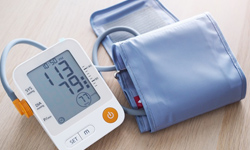
5 Misconceptions About High Blood Pressure

- Hypertension Is Not To Be Taken Very Seriously
This is far from true. Uncontrolled hypertension can lead to severe complications like stroke, aneurysm, dementia, organ failure and even a heart attack. To give you an estimate, 1 in every 5 Indians suffers from this disease. What’s further alarming is that an increasing number of hypertension instances are observed amongst the younger population. So yes, it is a condition that has to be taken very seriously.
- It Cannot Be Prevented
The condition can be prevented, even if you fall in a high-risk category like- heredity, lifestyle or increased susceptibility. Therefore, it would be wise to get yourself regularly checked for hypertension.
- Maintaining a healthy weight.
- Avoiding or limiting alcohol.
- Quitting smoking.
- Limiting stress.
- Having a healthy diet.
- Limiting salt intake.
- Regular exercise.
- It Is Ok As Long As One Of The Numbers Is Normal
You may observe your doctor referring to two numbers while assessing your blood pressure. The first and lower number refers to diastolic blood pressure, while the second and larger number refers to systolic blood pressure. Most patients pay attention to the systolic blood pressure, but experts suggest that the heart can cope with higher systolic pressure than diastolic pressure. Therefore, if you observe consistent above-normal blood pressure for either diastolic or systolic, you must visit your doctor.
- You’ll Have To Give Up On Your Favourite Foods If You Have High BP
Most of you relate hypertension to long-term treatment plans such as giving up activities, favourite foods, salt and regular medications. This does not hold for every case as the treatment plan varies from person to person.
These could include:
- Your doctor may advise you to follow the Dietary approaches to stop hypertension (DASH).
- Weight-reduction plan.
- Decreasing or quitting the consumption of alcohol.
- Quitting smoking.
- Drugs such as beta-blockers, ACE inhibitors and diuretics.
- The Treatment Plan Does Not Work
If you work closely with your doctor and design a detailed treatment plan as per your condition, you would observe your blood pressure maintained on average.
To increase the benefits, you should also:
- Closely and continuously monitor your blood pressure.
- Consult your doctor often.
- Know the side effects of the medications.
- Limit the salt intake.
- Follow the plan designed by your doctor.
Aside from this, you can prevent having hypertension by
Like any other health conditions, understanding high blood pressure and its harmful effects on health can save you a lot of damage by treating it without delay. It is essential to debunk the myths surrounding the condition and have sound reasoning while dealing with the issues.
Note of Caution: This article is for information purpose only. Always consult your doctor in case of any blood pressure or other health-related problems.

 This is far from true. Uncontrolled hypertension can lead to severe complications like stroke, aneurysm, dementia, organ failure and even a heart attack. To give you an estimate, 1 in every 5 Indians suffers from this disease. What’s further alarming is that an increasing number of hypertension instances are observed amongst the younger population. So yes, it is a condition that has to be taken very seriously.
This is far from true. Uncontrolled hypertension can lead to severe complications like stroke, aneurysm, dementia, organ failure and even a heart attack. To give you an estimate, 1 in every 5 Indians suffers from this disease. What’s further alarming is that an increasing number of hypertension instances are observed amongst the younger population. So yes, it is a condition that has to be taken very seriously. The condition can be prevented, even if you fall in a high-risk category like- heredity, lifestyle or increased susceptibility. Therefore, it would be wise to get yourself regularly checked for hypertension.
The condition can be prevented, even if you fall in a high-risk category like- heredity, lifestyle or increased susceptibility. Therefore, it would be wise to get yourself regularly checked for hypertension. You may observe your doctor referring to two numbers while assessing your blood pressure. The first and lower number refers to diastolic blood pressure, while the second and larger number refers to systolic blood pressure. Most patients pay attention to the systolic blood pressure, but experts suggest that the heart can cope with higher systolic pressure than diastolic pressure. Therefore, if you observe consistent above-normal blood pressure for either diastolic or systolic, you must visit your doctor.
You may observe your doctor referring to two numbers while assessing your blood pressure. The first and lower number refers to diastolic blood pressure, while the second and larger number refers to systolic blood pressure. Most patients pay attention to the systolic blood pressure, but experts suggest that the heart can cope with higher systolic pressure than diastolic pressure. Therefore, if you observe consistent above-normal blood pressure for either diastolic or systolic, you must visit your doctor. Most of you relate hypertension to long-term treatment plans such as giving up activities, favourite foods, salt and regular medications. This does not hold for every case as the treatment plan varies from person to person.
Most of you relate hypertension to long-term treatment plans such as giving up activities, favourite foods, salt and regular medications. This does not hold for every case as the treatment plan varies from person to person. If you work closely with your doctor and design a detailed treatment plan as per your condition, you would observe your blood pressure maintained on average.
If you work closely with your doctor and design a detailed treatment plan as per your condition, you would observe your blood pressure maintained on average.
Comments (0)
No comments found.Add your comment